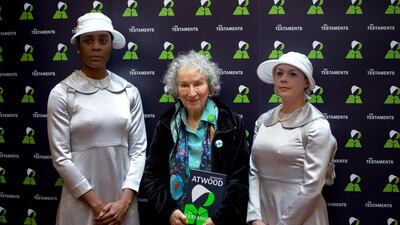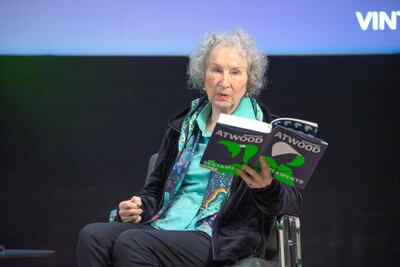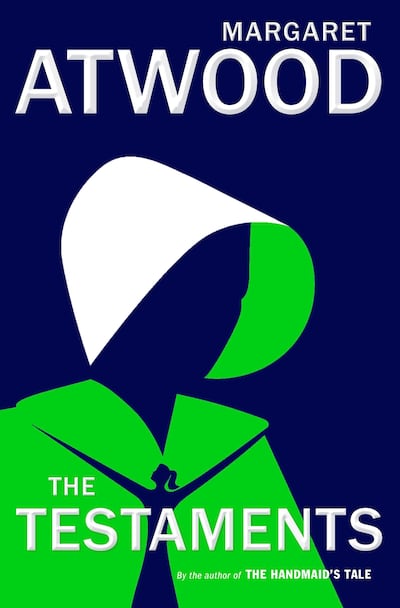It isn’t often that a Canadian author – let alone one publishing a sequel to a dystopian novel – takes London and the UK by storm, with hundreds of fans bearing the cold conditions to be among the first to get their hands on a book and a glimpse of its creator at the stroke of midnight on Tuesday morning.
But this is Margaret Atwood, no ordinary author, and the one who penned The Handmaid's Tale 34 years ago, a dark, disturbing and prescient novel, and a classic in its own right. It has attained cult status through its adaptation in recent years into a huge television success, starring Elisabeth Moss and Joseph Fiennes.
The hype around the book is clearly down to the US political landscape under Trump
Atwood launched the hugely anticipated and Booker Prize-shortlisted sequel, The Testaments, to a small gathering of international media journalists on Tuesday, including The National, in London's British Library, reading a short extract before answering media questions for 45 minutes.
Despite having had little sleep following with the midnight spectacle, Atwood was as she often is in front of an audience: witty, articulate and sage.
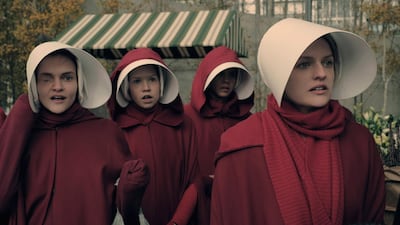
Much of the hype and anticipation around the book is clearly down to the current political landscape of the United States under President Trump, particularly the legislative attacks on abortion rights in a number of US states in recent years, most recently in Alabama.
“These restrictive laws about women’s bodies are claiming that the state owns your body. There is a parallel occasion for men and that would be the draft.”
The difference, Atwood comments, is that with conscription "they pay for [men's] lodgings, clothing, food, medical expenses and they give you a salary. I say to them: if you want to conscript women's bodies in this way you should pay them for them. As it is you are forcing women to deliver babies, enforcing childbirth, and you're not paying for any of it. That's very cheap. It's cheap labour, and that's a pun."
Inspired by the book and TV series, women have campaigned against this infringement on their bodies and rights by protesting outside legislative buildings in US state capitals, Buenos Aires, Dublin and elsewhere, dressed as handmaids. Atwood says she is happy to see campaigners using elements from her novels to fight gender oppression but said her role is limited.
“It’s a question of things escaping from the book into the real world and the author has zero control. But none of this would be happening if countries weren’t putting people in charge of women’s bodies who are not those women.”
'Instead of moving further away from Gilead, we started moving towards it'
Atwood says after she wrote The Handmaid's Tale, things initially looked positive with the Berlin Wall falling and the Cold War ending and, although fans asked her to write a sequel, the idea didn't seem relevant until recently.
"As time went on, instead of moving further away from Gilead" – the name of the totalitarian state that overthrew the US Government in The Handmaid's Tale and The Testaments – "we started moving towards it, particularly in the US, and I re-examined that position," says Atwood.
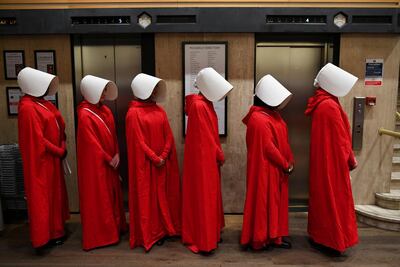
She sent the idea of the sequel to her publishers on 17 February 2017, following Donald Trump’s presidential victory.
The narrative is very different in The Testaments, says Atwood, exploring Gilead's terrifying society through three female narrators. The book is, in many ways, a study through its characters on the weaknesses that undermine totalitarian states.
“This [book] has three narrators and one of them – Aunt Lydia – knows a lot. She knows a J-Edgar/Hoover-lot. She knows a Thomas Cromwell/Henry VIII-lot,” Atwood says, revealing some of the research that went into the book, as well as citing the diaries of Joseph Goebbels and Nazi documentarian Leni Reifenstahl as influences in elements of the story.
“And they all did the same thing: they all collected dirt on people, which they then used in ways as one does in these positions of power,” Atwood says.
Is 'The Testaments' the end of the story?
Atwood insists that while the books explore some of the darkest elements of human nature, she is at heart an optimist.
“Writing is always an act of hope…whatever the content…because there is an assumed reader in the future.”
As one of the English-speaking world’s most celebrated, prolific and admired writers, the launch of Atwood’s latest book is said to make her a “literary rock-star”.
“Considering the lifestyles rock stars live, I’m nearly 80 and I haven’t yet died of an opiate overdose. Not yet. There’s time,” she jokes.
“This kind of thing can be quite ruinous for a 35-year-old. In my case, we kind of know the plot. Am I overwhelmed? I am very pleased and grateful to my readers who’ve stuck with me for all of these years.”
However, Atwood seems to be enjoying the fun and fever pitch that the launch has generated.
“London loves a happening! It is quite amazing how people will turn out in the middle of the night to see the big pile of books revealed, like Aunt Lydia’s statue. It was lots of fun and I think people had a grand time.”
So, does The Testaments mark the end of the story? Atwood knows better than to answer that either way.
“I never say never to anything – best not to tell anyone what you may or may not do. If you do something else it will be endless questions about why you didn’t do what you said you’d do. Politicians experience this all the time but writers can avoid it by just not saying.”
